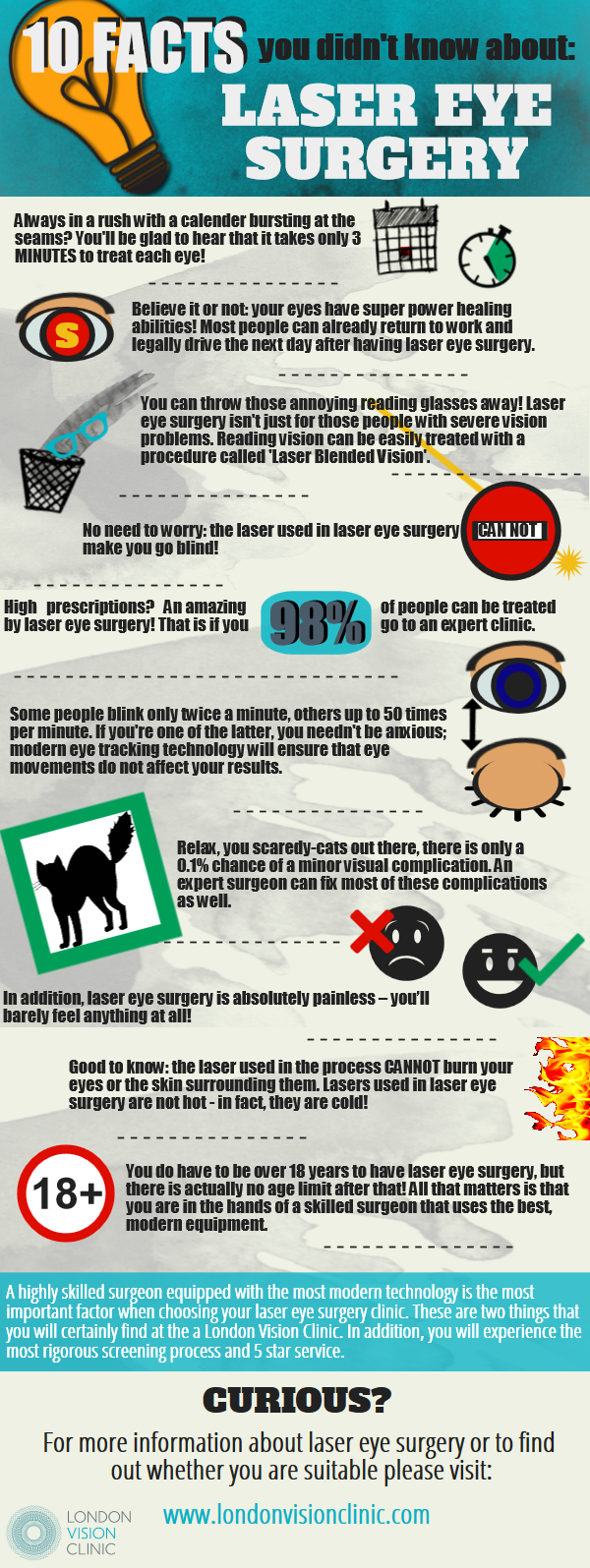Frequently Asked Questions Regarding Lasik Eye Surgery

Staff Writer-Skou Clayton
Before LASIK, your eye doctor will examine your vision to ensure it is stable. She or he will certainly additionally check to see if you have any other eye troubles that could impact your outcomes.
After the eye doctor has used numbing eye declines, he or she will produce a paper-thin flap in your cornea tissue making use of a tool called a microkeratome or laser. The procedure is painless.
What Is LASIK?
LASIK is a type of refractive surgery. It fixes vision troubles caused by refractive mistakes, which occur when the cornea or lens do not appropriately bend light rays.
Most people that have LASIK achieve great range vision without glasses or contacts. However, they might need analysis glasses to see close up. The results of LASIK are long-term, although visual negative effects are short-lived.
Can I Have LASIK if I Have Astigmatism?
Blurred vision is often brought on by astigmatism. LASIK can assist with this issue by making your cornea more in proportion. The cosmetic surgeon will utilize a device called a microkeratome or laser to reduce a slim flap in your cornea, then fold it back. They will after that use a laser to improve the cornea so it can flex light better.
The only thing that LASIK can not do is appropriate presbyopia (age-related farsightedness). This can only be performed with cataract surgery.
Can I Have LASIK if I Have Dry Eye?
A key part of the LASIK assessment is examining exactly how well your eyes produce splits. Some individuals with completely dry eye are incapable to get LASIK because it can intensify the condition.
Dry eye is a typical side effect of LASIK due to the fact that the treatment severs corneal nerves. However, Price For Laser Eye Surgery improves as the eye heals. You can make use of man-made splits as well as punctal plugs to handle your signs and symptoms.
Can I Have LASIK if I Have a Cataract?
For the most part, yes. LASIK can improve your vision after cataract surgery.
When you have a cataract, your lens is gloomy and also your close-up vision is blurry. LASIK can assist with this, in addition to your distance vision.
During LASIK, your doctor will utilize a laser or a blade to create a thin flap on your cornea. Then the doctor will fold the flap back and make use of a laser to reshape your cornea.
Can I Have LASIK if I Have a Retinal Detachment?
Retinal detachment usually arises from a retinal tear. The physician will certainly repair the tear with an in-office procedure called pneumatically-driven retinopexy. After the eye is numbed, the medical professional inserts an expandable gas bubble right into the eye to press the removed retina against its assistance tissue.
LASIK does not proper presbyopia, which creates as you grow older as well as triggers blurry close-up vision. Nevertheless, it can be integrated with mono-vision to minimize or remove the need for reading glasses.
Can I Have LASIK if I Have a Hyperopia (Farsightedness) or Nearsightedness (Nearsightedness)?
A lot of medical insurance companies do not cover LASIK because it isn't taken into consideration medically necessary. Nevertheless, they may reimburse individuals for lens implants if a specialist is part of their network.
Before you undertake LASIK, your ophthalmologist will certainly do a thorough eye examination. This will certainly consist of examining your general eye health and wellness, student size and also refractive mistake. She or he will certainly likewise determine the thickness of your corneas.
Can I Have LASIK if I Have Presbyopia (Aging Eyes)?
LASIK does not attend to presbyopia (loss of close to vision related to age). Instead, it fixes refractive mistakes by improving the cornea.
After numbing declines as well as covering the eye with a guard or patch, the cosmetic surgeon produces the flap. After that the laser improves the cornea. You may hear a clicking sound as well as scent an uncommon aroma. This is normal and also does not create injury.
Can I Have LASIK if I Have Keratoconus (Curved Cornea)?
In LASIK, your surgeon will utilize a femtosecond laser to cut a thin flap in the cornea. They will after that fold it back as well as utilize a different laser to improve your cornea.
Your vision is based on exactly how light enters your eye, bends through the lens and concentrates on the retina. Refractive mistakes keep light from concentrating appropriately as well as create blurred vision.
Can I Have LASIK if I Have Blepharitis (Inflammation of the Eyelids)?
Most patients choose LASIK due to the fact that they want flexibility from glasses or contact lenses. It is very important to review your objectives with your eye doctor prior to having the treatment.
look at here now is not uncomfortable. Eye decreases are positioned to numb your eyes before the surgical treatment. mouse click the following post describe really feeling a slight stress yet no discomfort. Recuperation from LASIK is reasonably quick. Your vision will be a little blurry and also light delicate right after surgical procedure however must enhance promptly.
Can I Have LASIK if I Have a Corneal Density Issue?
LASIK deals with vision by reshaping the corneal cells. To do this, the cornea should be thick enough for the doctor to create a flap.
If your corneas are also thin, you may be a candidate for laser vision improvement procedures that do not require creating a flap, such as PRK or Epi-LASIK. These procedures have similar results to LASIK however work in a different method.

